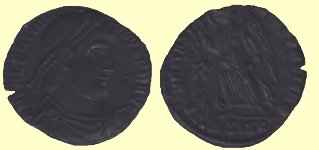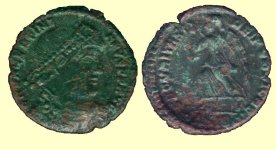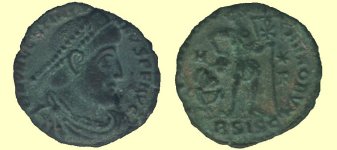
Valentinian I 364 - 375 A.D.
By clicking on the pictures you'll be linked to a more complete description of the coin. At the bottom of this page there is a more elaborate biography of the emperor.
 |
Obverse: DN VALENTINIANVS PF AVG |
| Reverse: SECVRITAS REIPVBLICAE | |
|
Fieldmarks: an R in the right field
|
|
| Exergue: |
 |
Obverse: DN VALENTINIANVS PF AVG |
| Reverse: SECVRITAS REIPVBLICAE | |
|
Fieldmarks: -
|
|
| Exergue: ΔSISC |
 |
Obverse: DN VALENTINIANVS PF AVG |
| Reverse: GLORIA ROMANORVM | |
|
Fieldmarks: an M in the left field and * over F in the
right field
|
|
| Exergue: BSISC |
Jovian died on the 17th of February 364 on the border between Bithynia and Galatia. The army Valentinian was campaigning with at the time marched on to Nicaea, the nearest city of any consequence where a meeting of civil and military officials was convened to choose a new emperor. The assembly finally agreed upon Valentinian, and sent messengers to inform him. Valentinian finally arrived in Nicaea on the 24th of February 364, the bissextile day. This day was used every four years by the Romans to balance the calendar much as we use the modern leap year. The sixth day before the first of March was counted twice but according to Ammianus (a historian), this day was considered an ill-omened day to begin any new proceedings, so Valentinian put off his official acceptance until the day after the bissextile (26th of February). As he prepared to make his accession speech, the soldiers threatened to riot, apparently uncertain as to where his loyalties lay. Valentinian reassured them that the army was his greatest priority. Furthermore, to prevent a crisis of succession if he should die prematurely, he agreed to pick a co-Augustus. By agreeing to appoint a co-ruler, he assured the eastern officials that someone with imperial authority would remain in the east to protect their interests on the first of March Valentinian selected Valens (his brother) as CO-Augustus On the 28th of March 364 Valens was given the Prefecture of the Orient, while Valentinian gained control of the Prefecture of Gaul, Italy, Africa, and Illyricum. Valens resided in Constantinople, while Valentinian’s court was at Mediolanum. Unlike the all to common tale of brothers sharing the empire and continuously plotting against each other in bitter hatred and contention, (see for example the sons of Constantine I and Caracalla and Geta). Valens and Valentinian got along wonderfully and shared a true affection for each other.
One of the first problems that faced Valentinian was an outbreak of hostilities in Gaul with the Alamanni, a loose confederation of Germanic-speaking people living beyond the Rhine, who invaded Gaul in 365. At the same time Procopius began a revolt against Valens in the east. Valentinian received news of both the Alamannic trouble and Procopius' revolt on the first of November while on his way to Lutetia. He had a choice to make: go east to help his brother or stay in Gaul and fight the Alamanni he decided to remain in Gaul and fight the Alamanni. This move shows two things. First, that Valentinian subordinated the eastern portion of the empire to the west. Second it shows that Valentinian was still unsure of his support in Gaul, a very important part of the west. There was no better way to win the support of the Gallic nobility than by performing the traditional imperial duty of preserving peace by defeating barbarians. Valentinian advanced to Durocortorum and sent two generals, Charietto and Severianus, against the invaders. The armies of Charietto and Severianus were promptly defeated and the generals killed. Dagalaifus was then sent against the enemy in 366, but he claimed that the Alamanni were so scattered about Gaul that he would be ineffective. Jovinus replaced Dagalaifus late in the campaigning season, and, after several battles, Jovinus pushed the Alamanni out of Gaul and was awarded the consulate of 367 for his efforts.
Valentinian was distracted from launching
a punitive expedition against the Alamanni at this time by problems in Britain
and northern Gaul. The Alamanni, however, were not deterred by their earlier
defeat at the hands of Jovinus and they returned to Gaul. The city of Moguntiacum
was sacked and plundered by an Alamannic raiding party in late 367 or early
368. Valentinian did succeed in getting Roman agents to arrange the assassination
of Vithicabius, an important Alamannic leader, by his personal bodyguard, but
more serious measures were called for. Valentinian was determined to bring the
Alamanni under Roman power once and for all, and spent the winter of 367/8 gathering
a huge army for a spring offensive. Valentinian and his army crossed the Rhine
in the spring of 368 they did not encounter any resistance until they reached
Solicinium.
A tremendous battle was fought at Solicinium,
with the Romans coming out on top, although Valentinian was nearly killed. A
temporary peace was apparently reached, and Valentinian returned to Trevirorum
for the winter.
In 367, Valentinian received reports that
a combined force of Picts,
Attacotti
and Scots
invaded roman Britain and as a consequence, Britain was in a state of anarchy.
At the same time, Frankish
and Saxon
forces were harrying the coastal areas of northern Gaul.
Valentinian, alarmed by these reports, set out for Britain,
sending Severus (comes domesticorum)
ahead of him to investigate. Severus was not able to correct the situation and
returned to the continent, meeting Valentinian at Ambianorum.
Valentinian then sent Jovinus to Britain it was at this time that Valentinian
fell ill and a battle for succession broke out between Severus, a representative
of the army, and Rusticus Julianus a representative of the Gallic nobility.
Valentinian, however, recovered and appointed his son Gratian
(about 8 years old at the time) as Augustus to forestall any such conflicts
in the future. Jovinus quickly returned from Britain, saying that he needed
more men to take care of the situation. Beginning in 368 Valentinian, however,
was intent on pressing his successes against the Alamanni with a campaign into
their territory. Therefore, he assigned the comes
Theodosius the task of recovering Britain while Severus and Jovinus were to
accompany the emperor on his campaign. In 369, Theodosius, relying on the tactics
of stealth and ambush, set about reconquering the areas north of Londinium.
After this conquest Theodosius restored destroyed fortifications and even recovered
a lost province which was renamed Valentia
after his return in 369, Valentinian promoted Theodosius to magister
equitum.
In 370, Saxon pirates attacked northern Gaul after several battles, a truce was called and the Saxons gave the Romans many young men fit for duty in the Roman military in exchange for free passage back to their homeland. The Romans, however, treacherously ambushed the Saxons, killing them all (the young men who would serve in the roman army as auxiliaries where quickly transported to other parts of the empire and would probably never hear what happened to the others). At the same time, Valentinian was planning another attack against the Alamanni this time his target was Macrianus, a powerful Alamannic chieftain. Rather than directly attacking Macrianus, he tried to persuade the Burgundians to attack: they were another Germanic-speaking people and bitter enemies of the Alamanni. If the Alamanni tried to flee, Valentinian would be waiting for them with his army. Negotiations, however, with the Burgundians broke down when Valentinian, in his usual high-handed manner, refused to meet with the Burgundian envoys to personally assure them of Roman support in the suggested attack. Nevertheless, the proposed alliance with the Burgundians did have the effect of scattering the Alamanni through fear of an imminent attack from their enemies. This event allowed Theodosius (one of Valentinians generals) to attack via Raetia and take many Alamannic prisoners. These captured Alamanni were settled in the Po river valley where they where given fertile land and where they formed a successful community of tax paying farmers. Valentinian campaigned unsuccessfully for four more years to defeat Macrianus. In 374 Valentinian was forced to make peace with Macrianus because the emperor's presence was needed to counter an invasion of Pannonia by the Quadi and Sarmatians.
In 373 trouble had started with the Quadi, a group of Germanic-speaking people living on the Danube. The Quadi were outraged that Valentinian was building fortifications in their territory. They complained and sent deputations that were ignored by the local roman rulers. However the protests of Quadic leaders delayed the project, and in a fit of frustration, Marcellianus (the son of the prefect of Gaul who was put in charge of building the fortifications) murdered the Quadic king Gabinius at a banquet arranged for peaceful negotiations. This roused the Quadi to war, along with their allies the Sarmatians. During the fall harvest, they broke across the Danube and began ravaging the province of Valeria (eastern part of Pannonia.) The marauders could not penetrate the fortified cities, but they heavily damaged the unprotected countryside. Two legions, the Pannonica and Moesiaca, were sent in, but they failed to coordinate their efforts and were routed by the Sarmatians. At the same time, another group of Sarmatians invaded Moesia, but they were driven back by the dux Moesiae Theodosius the younger, future emperor and son of the magister equitum Theodosius the elder.
Valentinian did not receive news of these disasters until mid-to-late 374. In the spring of 375 he set out from Trevirorum and came to Carnuntum (capital of Pannonia), which was deserted. There he was met by Sarmatian envoys who begged forgiveness for their actions. Valentinian replied that he would investigate what had happened and act accordingly. Valentinian ignored Marcellianus’ treacherous actions and decided to punish the Quadi he spent the summer months preparing for the campaign and finally crossed into Quadic territory at Aquinicum. After generally pillaging the Quadic lands and carrying out acts of terrorism, he retired to Savaria his winter quarters. He decided to continue campaigning and moved from Savaria to Brigetio it was here that he received a deputation from the Quadi on the 17th of November 375, in return for supplying fresh recruits to the Roman army, the Quadi were to be allowed to leave in peace. Before the envoys left, however, they were granted an audience with Valentinian. The envoys insisted that the conflict was caused by the building of Roman forts in their lands, and that furthermore individual bands of Quadi were not necessarily bound to the rule of the chiefs who had made treaties with the Romans, and thus might attack at any time. The attitude of the envoys so enraged Valentinian that he had a fit and died of a stroke. His fifteen year old son Gratian was appointed emperor in his place.
Valentinian is generally credited with keeping the Roman empire from crumbling away by reversing the generally waning confidence in the army and imperial defense's. But his reign also changed Roman society, civilian as well as military. First, there was a growing fracture between the eastern and western portions of the empire. Valentinian was the last emperor to really concentrate his resources on the west, Valens was clearly in an inferior position in the partnership. Second, there was a growing polarization of society, both Christian versus pagan, and civil versus military. Finally there was a growing regionalism in the west, the provincial populations became increasingly alienated from the imperial government. They were crushed under the increasing burden of taxation and Valentinian failed to fully exercise military authority in all areas of the west which they were paying for with these heavy taxations. All of these trends would continue over the next century, profoundly reshaping the Roman empire and western Europe.
For this biography I've used the texts from the following websites:
http://www.imperiumromanum.com/
http://www.roman-emperors.org/
http://www.roman-empire.net/
And from: Gibbon's Decline and fall of the Roman empire.